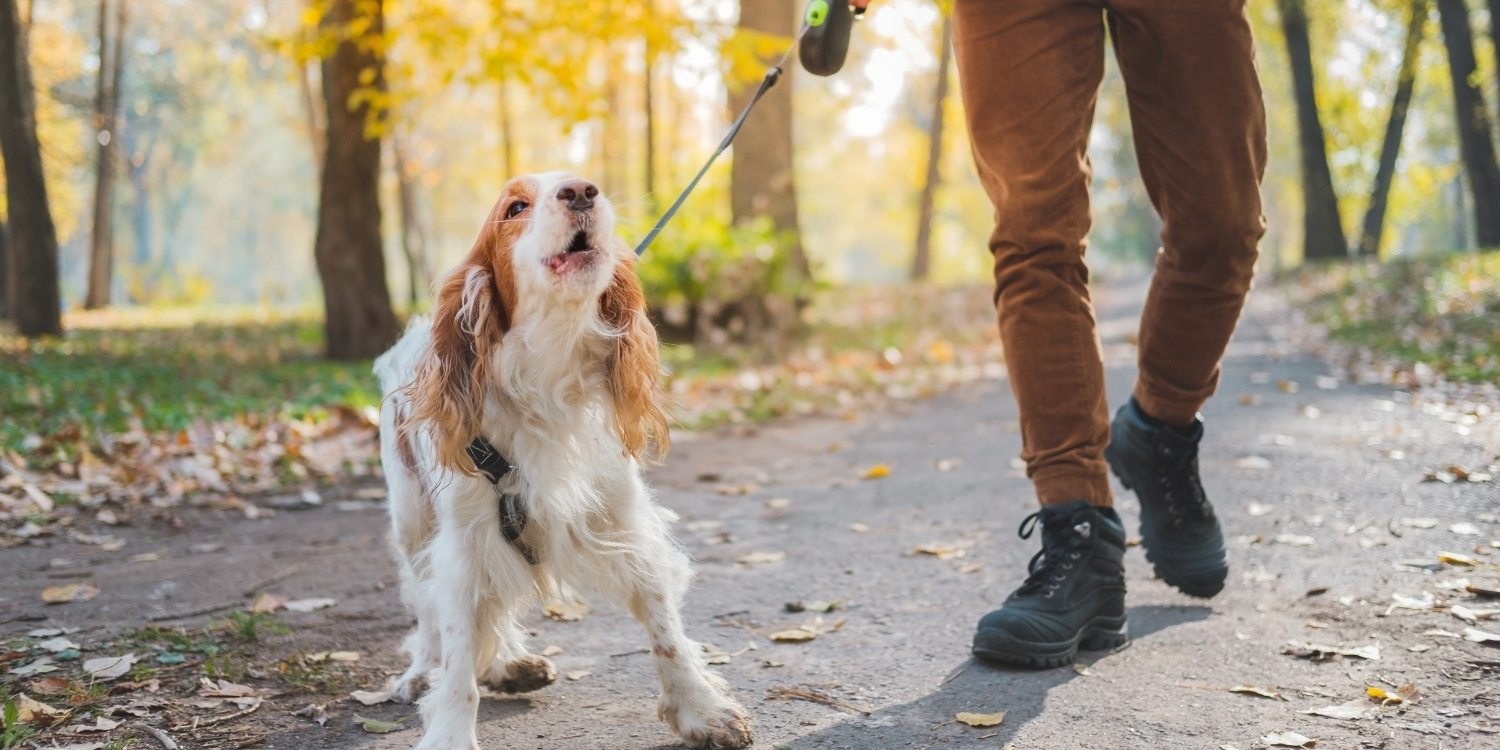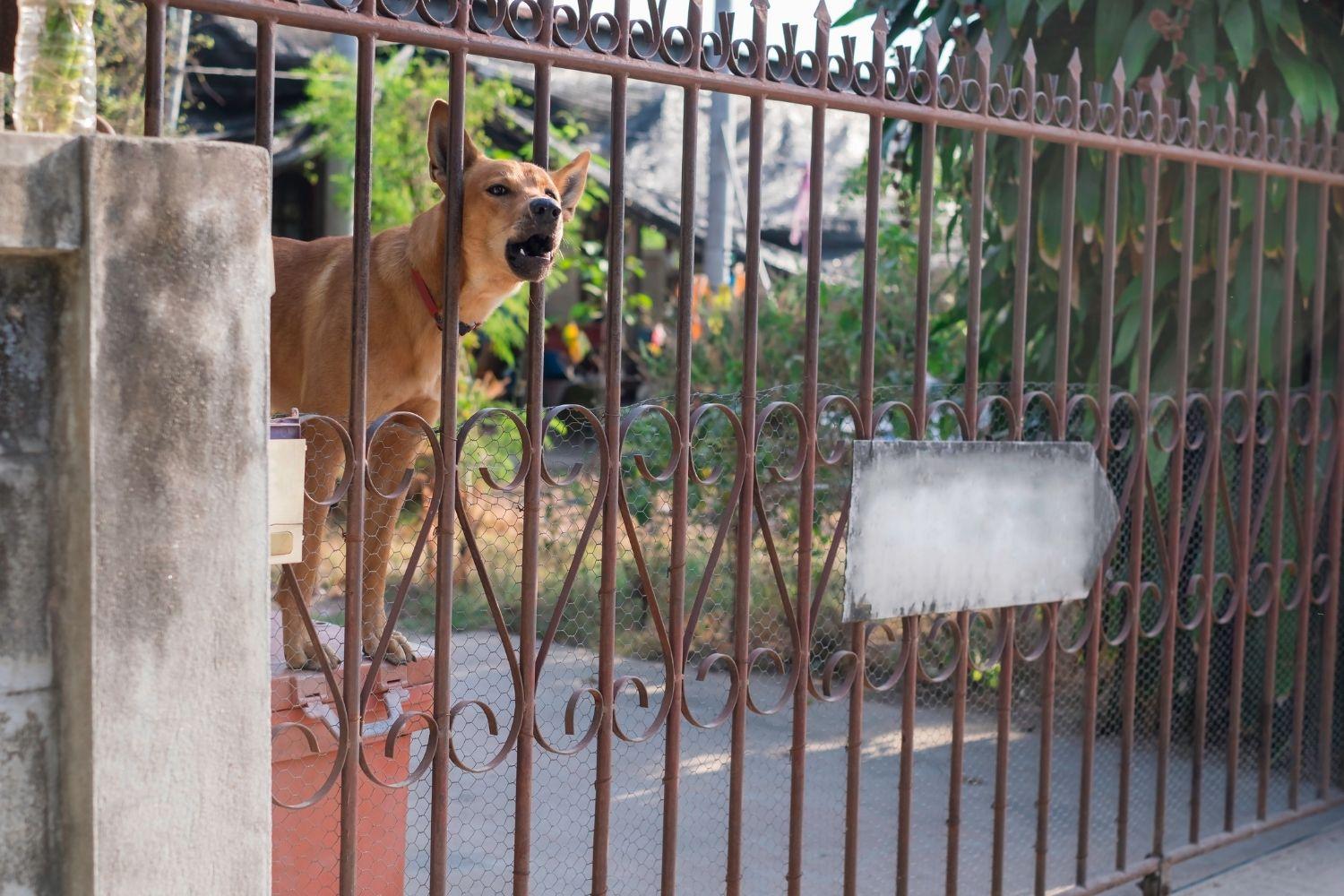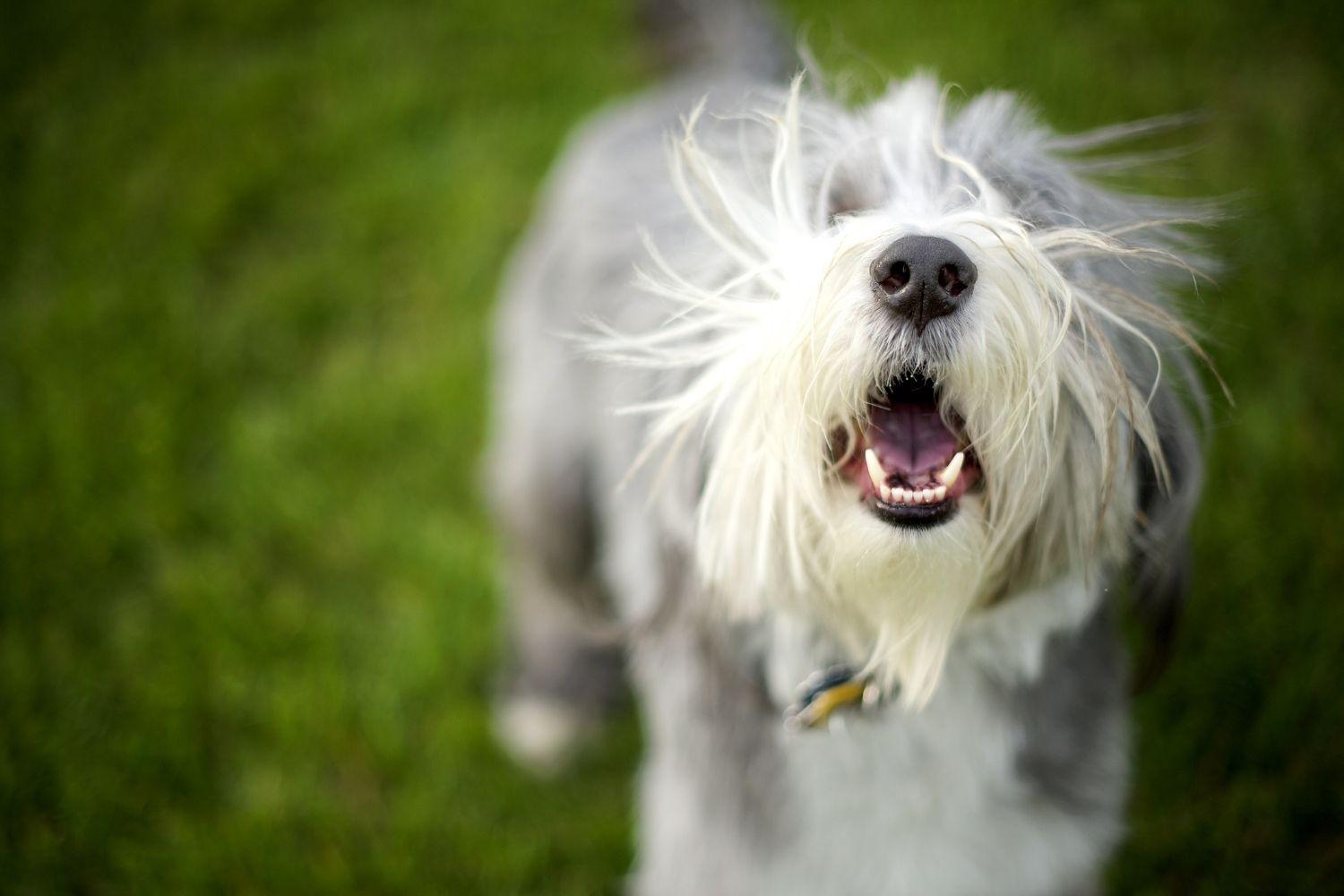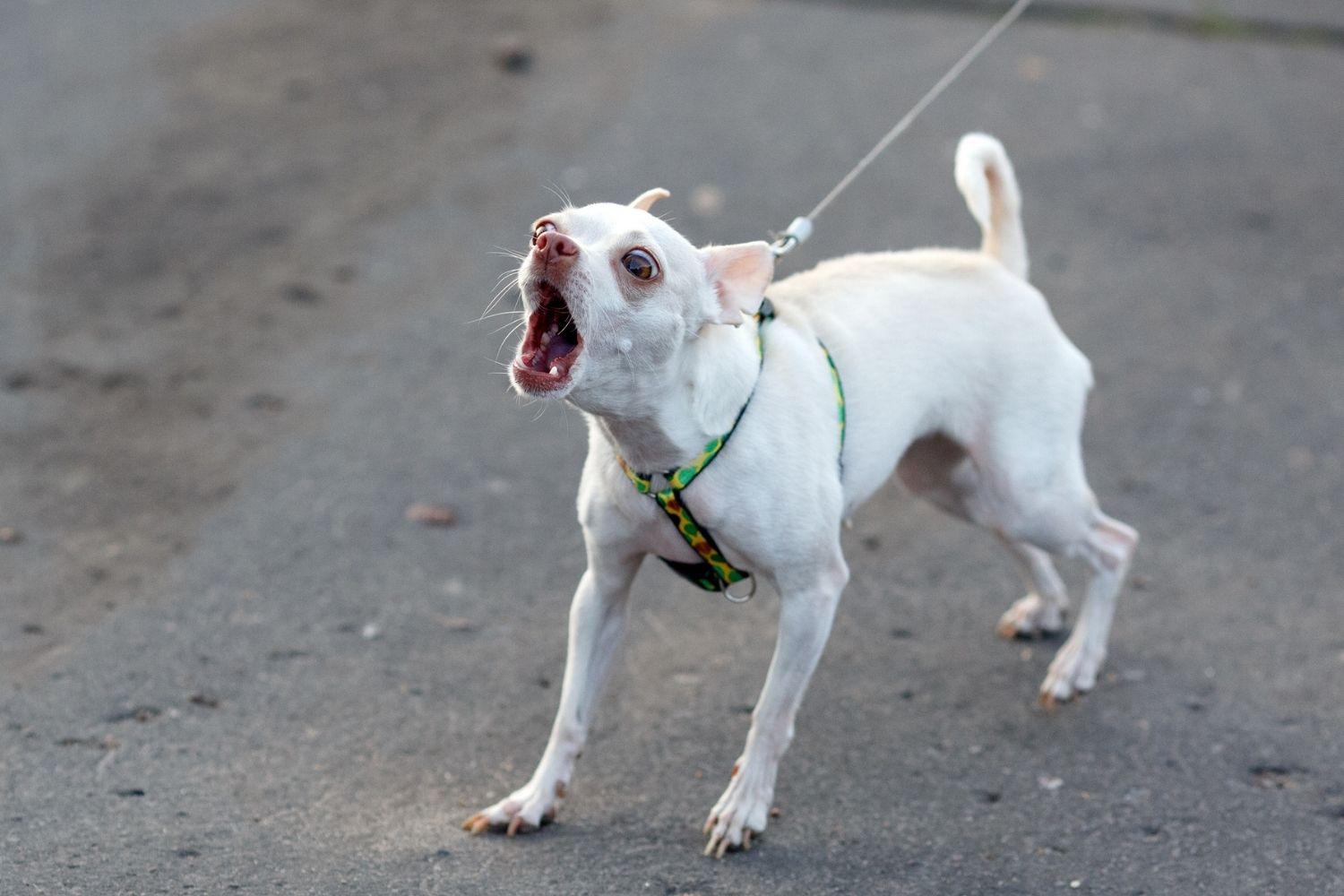Wondering why your pup barks so much? Wish they would stop? Here's a guide on how to stop a dog from barking.
Barking is a normal reaction dogs have to many different situations. But of course, sometimes it becomes excessive or even scary, especially if they tend to bark at other people or dogs when you're out for a walk.
The big questions are… Why is my dog barking? When is barking a problem? And what can I do to stop my dog's barking?
Although dogs bark to express themselves for many different reasons, there are things you can do to avoid some of them. And we're here to give some helpful advice!
Why Do Dogs Bark at Other Dogs & People?
The first place to start is with the "why?" There are actually many different reasons why a dog barks. And keep in mind that some dog breeds bark more than others. If you weren't aware of that before you added this furball to your family… Sorry! But it's true. Beyond that, here are some of the reasons why your dog might bark.

Different Reasons a Dog Barks:
- Attention – Your dog may bark just because they want your attention, or for you to engage with them. Dogs can be needy too.
- Boredom – Sometimes, dogs will bark because they are bored—especially if they lack the appropriate exercise and mental stimulation in their daily routines.
- Cognitive Dysfunction – Sadly, as dogs age, they might struggle with cognitive dysfunction. This could cause them to feel confused or frightened.
- Excitement – If your dog sees that you're about to walk in the door, get out a treat, take them for a ride, or throw their ball… They could start to bark in anticipation and excitement.
- Fearful – This is similar to territorial barking, but it's more out of fear of something scary or unsure, instead of out of aggression.
- Frustration – Your dog might bark if they cannot do something they want to do or if the thing they expected doesn't happen.
- Playful – Many dogs will bark when they're ready to initiate playtime with you.
- Separation Anxiety – Lots of us have experienced this since quarantine. Your dog might feel anxious and stressed when you leave the house or if they are left alone.
- Social – Sometimes, dogs just bark in response to other dogs barking.
- Territorial & Alarm – Depending on your dog's breed and upbringing, they might try to protect you and their home. This bark is to keep away anyone they perceive as an "intruder." Or to warn you of a suspicious sound.

What are High Stressors for Dogs on Walks?
Although barking is normal, if it becomes excessive, that could be a sign of an underlying issue. Dogs don't have memories the same way we do. They remember things through association rather than a "video clip replay." So if they've had a bad experience on a walk before, they could have a negative association with walks in general—even if everything is ok now.
Another thing to remember is that dogs can sense our body language, tone of voice, and "energy." So if you're feeling anxious on the walk because you're anticipating that something will go wrong, your dog will feel that energy and react negatively.
Famous dog trainer, Cesar Millan, reminds us that "if you see another dog approaching, and [you] tense up on the leash, your dog is going to understand this as, 'Uh-oh. Something is dangerous. Must protect!'"
So even if your dog has never been attacked by another dog or human—they will sense that you're nervous, anxious, scared, etc. And they will either feel fearful or protective. And then react accordingly.

Tips & Tools to Help Stop a Dog from Barking
Although we can't guarantee that your dog will 100% stop barking from these tips—if you stay committed and consistent, they really should help! Even the American Kennel Club agrees… You can train your dog to stop barking and lunging on walks.
- Work on obedience in your home. Your home is a calm, quiet, safe space for your dog. It's the best place to practice any training. You can practice walking nicely. And use treats or other rewards for good performance.
- Don't go on a walk until your dog is calm. You'll have to teach your dog that they don't get to walk until they are calm and submissive. This takes time, patience, and consistency. Just make sure not to put your dog's harness or leash on until they are sitting calmly.
- Avoid high-stress situations. If your dog gets nervous around traffic, take them walking on a quiet, nature path rather than on a sidewalk near a busy road. If crowds make them anxious, choose less crowded areas and less busy times of the day.
- Teach your dog to heel. This seems to be a dog trick that goes by the wayside but is super helpful! Teaching your dog to heel means they learn to sit right behind your heels and stay by your side until you dismiss them. This can help keep your dog still and calm when other people or dogs are walking by.
- Use positive reinforcements. Although our instinct is to punish for bad behavior… It's much more important to reward your dog for good behavior. This kind of training is what dogs actually respond to. When they are misbehaving, it's because they are anxious or stressed anyway. And being punished just adds to the stress.
- Clickers. Try training with a clicker. These are used to signal your dog when they are doing a good job. But take the time to intentionally train them with it first.
- Bark collars. We don't recommend any training or tools that cause physical harm to animals. But there are collars that make noises, vibrate, or spray scents to signal your dog when they are doing something undesired.

Reminders of What "Not to Do"
Here are some reminders of things not to do on your walk. We want to avoid anything that can make the situation worse.
- Don't expect the worst. As we mentioned earlier, your dog can sense what you're feeling. And sometimes feeling anxious about something going wrong will actually cause things to go wrong. Just stay calm, confident, and positive.
- Don't panic and pull away. Your actions are constantly signaling your dog. So if you see another dog or person on your same walking path—remain calm, and act casual. If you do, this will help tell your dog that everything is fine. They don't need to feel scared or threatened.
- Don't get mad. If your dog does react poorly, don't start yelling at them. This just makes them feel more anxious, and possibly more aggressive. The best thing is to remain cool, calm, and collected.
When Should I Hire a Dog Trainer for Barking?
For the majority of dogs, these simple tips will work. But there are situations where a dog becomes out of control, and harms other dogs or people. In this case, it's time to consider hiring a dog trainer.
This doesn't mean that your dog is terrible, or too far gone. It just means you're acknowledging the fact that they need a little extra intentional training. And these dog trainers are certified professionals who have devoted their lives to training canines. They know what they're doing, and they know how to help.
If you're ready to start looking, you can find a local dog trainer through LocalPetCare.com. Just type in your zip code, and you'll find tons of amazing local pet care professionals in your area. It's never too late.
My Dog Barks at Everything!
Teaching a dog to be calm on a leash is an important skill for them to learn—and it will keep you both safe. Don't give up on your pup just yet. There is hope!
Dogs need exercise, and walking with you is a great bonding activity for the two of you. And they'll never learn if you stop taking them on walks altogether. Try these helpful tips, stay consistent, and always remain calm. Little by little—you will see progress.



